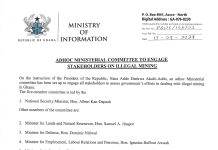The Hon. Deputy Minister for Information, Hon. Sylvester Tetteh
The Country Director, UNESCO International,
The Secretary-General, Ghana Commission for UNESCO,
The Executive-Secretary, Right to Information Commission,
The President, Ghana Journalists Association,
The President, Ghana Independent Broadcasters Association,
Staff of Ministry of Information and Information Services Department,
Friends from the Media
Ladies and Gentlemen
Good morning!
I join the Chief Director in welcoming you all to the Ministry of Information. Usually, when we invite you, it is to talk about what some other Ministry, Department, or Agency is doing. Today, we have invited you here to announce a remarkable milestone, one that will not only resonate throughout our nation and beyond but also underscore our unwavering commitment to progress, transparency, and global collaboration.
I am thrilled to announce that UNESCO has selected Ghana to host the 2024 Global Conference of the International Day for Universal Access to Information (IDUAI). This prestigious event will take place in Accra on October 1–2, 2024, under the theme “Mainstreaming Access to Information and Participation across the Public Sector.” This significant recognition serves as a testament to our progress in promoting Ghana’s right to information.
BRIEF HISTORY BEHIND GHANA’S RTI LAW
Ladies and Gentlemen, Ghana has a unique history regarding the right to information. Although the 1992 Constitution provides for people’s right to access information held by public institutions, there was no Act of Parliament to establish procedures for its implementation. Seven years after the 1992 Constitution came into force, the Institute of Economic Affairs (IEA) prepared the first draft of a right to information bill to promote access to information in Ghana. However, the passage of the bill into law was delayed through different political administrations. This lengthy wait was characterised by vigorous advocacy from civil society, leading to the establishment of the Coalition on the Right to Information, Ghana (RTI Coalition) in 2003. Over the course of a decade, Parliament worked on four separate drafts of the Right to Information (RTI) bills. Parliament finally passed the RTI Law on March 26, 2019. Once the bill reached the President’s desk, he assented to it on May 21, 2019. However, implementation did not begin immediately due to a provision in Section 86 of the Act stating: “This Act shall come into force at the commencement of the next financial year.” This provision was necessary to ensure the required infrastructure and personnel were in place before implementation. The law’s implementation finally began in 2020. Since then, we have achieved remarkable progress, which I am delighted to share with you today.
SOME ACHIEVEMENTS SO FAR
First, we have established the Access to Information Division (ATID) within the Information Services Department, which coordinates the establishment of information units in public institutions and the recruitment, training, and posting of RTI officers to the information units. Thus far, the ATID has posted 350 RTI officers to public institutions nationwide. These officers are the frontline facilitators who uphold the public’s right to access information. ATID also plays a vital role in providing technical support to RTI officers, ensuring they are well-equipped to perform their duties efficiently. This foundational step is to ensure that the machinery for access to information is well in place.
Second, the Right to Information Commission has been set up and equipped with the necessary resources, logistics, and staff to operate effectively. The commission serves as the regulatory body for our RTI framework, ensuring compliance and addressing grievances.
In collaboration with UNESCO, ATID has supervised RTI officers as they undertake a certified online course on access to information and its implementation. This initiative has enhanced the capacity of our RTI officers, ensuring they are knowledgeable and well-versed in global best practices.
Additionally, ATID has conducted extensive research on the implementation of the RTI law in Ghana. This research provides valuable insights and data, enabling us to continuously refine and improve our approach to ensuring universal access to information.
THE UNESCO’S PROCLAMATION
Ladies and Gentlemen, the United Nations proclaimed September 28 as the International Day for Universal Access to Information at its 74th General Assembly in October 2019, following UNESCO’s initial proclamation in 2015. This day aims to raise awareness about the need to expand information laws and their actual implementation, thereby building inclusive institutions worldwide.
Various countries have been hosting the global celebration of IDUAI since its inception. The 2024 Global Conference marks the first time this celebration is hosted by an African Member State, providing an opportunity to highlight successful access to information practices on the continent.
HIGHLIGHTS OF THIS YEAR’S CONFERENCE
The conference’s main objective is to offer Governments and civil society a list of best practices for mainstreaming the right to information into the organisational systems and culture of different public authorities. Mainstreaming is, among other things, a key mechanism for addressing the culture of secrecy that prevails in most public authorities in the early days after a new right-to-information law is adopted.
Ladies and Gentlemen, this year’s conferencewill include a high-level Inter-Ministerial panel discussion to improve mainstream access to information across the Government sectors. The panel will allow Ministers to highlight the importance of an enabling environment for the Right to Information, focusing on Legal, Technological, and Sustainable Development aspects of access to information.
There would also be special and breakaway sessions throughout the first and second days, which will focus on advancing access to information in critical sectors such as environment, health, ICTs, etc. They will also discuss the role of the standard-setting instruments from the African Union, the Council of Europe, and other intergovernmental organisations, focusing on various mainstreaming aspects of access to information.
Ladies and Gentlemen, the Global Conference will be concluded by adopting an Accra Statement titled “Harnessing the Power of Data for Positive Change: A Commitment to Access to Information” and launching a Special Joint Publication commemorating the 10th anniversary of the Model Law on Access to Information in Africa.
Hosting the 2024 Global Conference of the International Day for Universal Access to Information is not only a recognition of our efforts but also a call to action to continue advancing the frontiers of transparency and accountability. It presents us with an unparalleled opportunity to showcase our achievements, share best practices, and learn from other nations committed to upholding the right to information.
As we prepare to host this prestigious event, let us reaffirm our dedication to the principles of openness and accountability. Let us continue to build on our achievements, ensuring that any person can seek, receive, and impart information freely.
In closing, I extend my heartfelt gratitude to UNESCO for this honour and to all the stakeholders, public servants, and citizens who have contributed to making our RTI journey a success. Together, let us make the 2024 Global Conference of the International Day for Universal Access to Information a landmark event that will inspire and propel us towards even greater transparency and empowerment.
Thank you, and God bless our homeland Ghana.

























